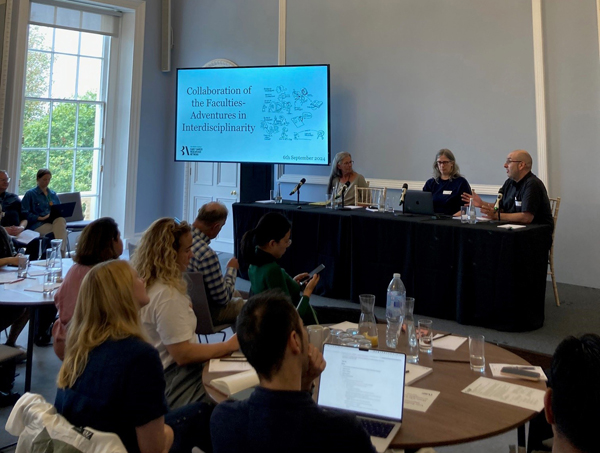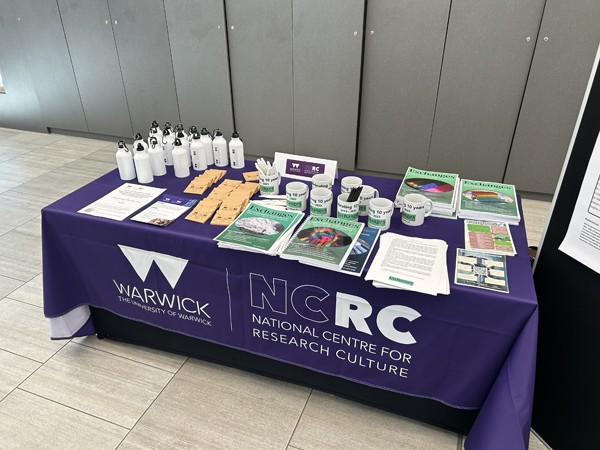Writing about web page https://exchanges.warwick.ac.uk/index.php/exchanges/
British Academy event for early career researchers explores some exciting and innovative thinking about interdisciplinary working and research.
Hyperbole is omnipresent in Linked.In posts, to a routinely and often nauseating superfluidity, but for once when I posted last week about being ‘delighted’, ‘honoured’ and ‘inspired’ by an event I attended: this was quite simply the honest truth. Last Friday (6th Feb) I had the genuine pleasure to head into London to the prestigious British Academy’s Westminster headquarters to attend their Early Career Researcher Network’s event entitled Collaboration of the Faculties - Adventures in Interdisciplinarity. This intriguingly titled event promised to explore the challenges of combining differing perspectives and methodologies, dissemination of interdisciplinary work and how to engage audiences across the disciplines. No small challenge!
I’d been approached way back in March this year by Paula Back, the BA’s ECR Network Officer, to get involved as a panellist. I realised from the outset, rather gratifyingly, I was one of the first people who’d been approached, which was a rare treat. Since then, there’s been a regular stream of conversation from the organisers which I’ve been privy too as they built up to the event. It felt very inclusive, and welcoming, to be included in this, rather the often-distant communications one has when speaking at other events! Certainly, I will say the planning organisation and delivering of this researcher development event was pretty much close to my personal ideal, and everyone involved should be commended for it!
On the day, the first thing that struck me was how welcoming and engaged everyone present was. I know most of the audience, beyond the speakers, are self-selected – those who have decided to attend. Yet, the resultant audience was so receptive you’d almost suspect they’d be carefully chosen to attend based on their willingness to engage! Certainly, at many conferences I’ve attended, many people head off into their cliques or friendship groups, to the exclusion of a wider conversation. Being somewhat of a wallflower [1] I sometimes find it challenging to network and have wider discussions as a result. This wasn’t a problem at the BA event, as I barely stopped talking for the entire event run time [2.] Frankly, by the end of the day, I was ready to go silent for some hours and simply let my brain start to reflect on the event.
Now, I’m not going to try and capture a blow-by-blow account of the day. There were so many excellent speakers, questions and side-discussions that it would take me far too long to recount. Not to mention, I’m sure there are better scribes than I out there who will have written a fuller accounting [3]. What I will share though are some of my key takeaways that have resonated with me over the weekend – in no order of priority!
Language barriers: A common theme was the difficulty of speaking to non-domain experts about your research or work, without using terms which are at worst opaque, or where you end up explaining them in other domain terms. Not ideal! When attempting to apply for funding or forming an effective interdisciplinary research teams, it is exactly these sorts of linguistic barriers which can create a genuine challenge to team cohesion and effectiveness. These sorts of barriers are perhaps even more apparent when scholars consider outlining their research or its outcomes to the public or to members of policy sphere and political classes.
Identity: A personal quandary for many researchers seeking to move to an interdisciplinary space or sphere of working. HEIs and senior executives continue to express their keenness for researchers to be more interdisciplinary in their working and practice. However, many of the esteem markers and career progression mechanisms are simply not configured to recognise or authenticate the ‘value’ of such work. Domain specific research remains more ‘significant’ in terms of these esteem markers, which means in terms of establishing an identity and even a career as an interdisciplinary researcher it can be a major uphill struggle with a slower progression to the senior grades. This was an area within which a number of speakers highlighted the importance of policy makers in changing perceptions and the lived reality.
Power Dysfunctions: A theme common to me from my own publishing research, but the existence of power dynamic imbalances are an issue even within interdisciplinary researcher groups. We’ve all encountered the ‘powerful’ and ‘dominant’ PI. Yet, broadly speaking, when groups of researchers come from across the disciplines to tackle a common problem scientists will typically view a problem from a certain vantage point or precept to those in the humanities, for example. Now, whomever is the driving or vocal force within the group – hierarchically speaking or simply by force of personality, can artificially close off exactly the kind of exciting, original or novel paths of exploration which interdisciplinary working is supposed to enable. As one speaker put it ‘to the [man] with the hammer, every problem looks like a nail’. [4] Overcoming this, can mean serious changes to underlying research culture too, another topic within which I’m heartily familiar.
Show Don’t Tell: When seeking to engage audiences around novel interdisciplinary-related concepts, methodologies or approaches – be they fellow researchers, the public, media or policy makers – ‘show don’t tell’ is a great approach [5]. It can help overcome some of those language barriers mentioned above, but can also help the interdisciplinary researcher by ‘forcing’ them to recontextualise their own work and potentially see it in a fresh light. Quite simply, by finding new ways to engage with audiences (and have audiences engage themselves) simply having objects, exhibits or interactive interventions can ensure a greater degree of success than simply seeking to ‘explain’ an interdisciplinary idea, research, method or methodology.
The Future is Interdisciplinary: ‘Complex real-world problems require interdisciplinary solutions’ as one speaker succinctly put it. When you look at global problems – climate change, space-exploration, healthcare etc., – there is no singular research domain that has the complete picture or solution. Working across boundaries, brining knowledge, expertise and ability from across the interdisciplinary spectrum is key to creating effective, practical leavers to affect successful change or outcomes. Getting this degree of buy in (and appreciating some of the challenges mentioned above) though, is still a journey: not everyone is ready, willing or able to step out of their disciplinary silo. Yet. Perhaps in a decade or so this might be a more natural expectation – look at the move towards open publishing for example – but for now, disciplinarity remains the realpolitik and de facto ruling principles of the academy.
Connectivity is Key: I would argue the event itself was this connectivity made manifest, but in achieving this effective interdisciplinary working future for researchers and society, finding people who are likeminded, who are willing to step beyond the disciplinary and helping to support and enable each other is key goal. Fresh and exciting perspectives await!
Alongside this exciting stuff, I was speaking myself about Exchanges and our role in facilitating interdisciplinary publishing – without any myopic application of ‘true’ or ‘authentic’ interdisciplinary research: we remain catholic, welcoming and all-encompassing in our approach. I was gratified to have such a positive feedback from the audience to my comments and answers to questions, as well as the delegates and organisers I spoke to throughout the day, about Exchanges’ rationale and approach. I hope in our own, modest, way we can help engender the kinds of exchanges (#sorrynotsorry) which the British Academy event was seeking to enable through this event. Certainly, from a more pragmatic standpoint, as more than one potential author spoke to me on the day and subsequently about future article ideas, I’m excited to see what fresh perspectives we can help bring to global attention in our forthcoming issues.
---
My grateful thanks to everyone attending, who asked a question and of course the British Academy for the invite to get involved in the first place. I had a simply terrific day, and I suspect a version of this blog post will be appearing as a future editorial in Exchanges itself! So, I was certainly inspired too.
---
Endnotes
[1] No, honestly, I am. Despite appearances to the contrary.
[2] Except, naturally, during the presentations.
[3] Of course if anyone would like to submit a critical reflection article on the events and speakers of the day, I’d be more than happy to consider it for publication!
[4] I work with a lot of scientists, and this feels very true to me – there’s always a positivist viewpoint that is privileged over others – frustrating!
[5] And one I’ve long loved from screenwriting theory and practice, I should note.


 Gareth Johnson
Gareth Johnson

 Please wait - comments are loading
Please wait - comments are loading

 Loading…
Loading…

